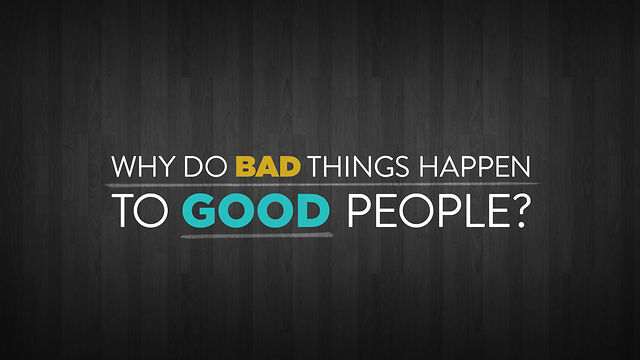Why do good people suffer?

One of the most commonly asked questions is, “Why do bad things happen to good people?” It’s a fair question, but I don’t think it’s the right question. Here’s why.
There aren’t any good people
If we were going to rank people on a goodness scale, where would we put Jesus? I mean, Hitler has to be at the bottom of that scale, right, and then people like Mother Theresa would be at the other end. But wouldn’t Jesus be the best good person on that scale? A leader in the religion of Jesus’ day thought so, and so he addressed Him as Good Teacher.
The response given by Jesus is worth paying attention to. “Why do you call me good?” Jesus asked him. “Only God is truly good.” (Luke 18:19 NLT, emphasis mine)
Only God is good. Jesus’ words, not mine. So, the world isn’t divided into good people and bad people, but people and a good God. So bad things don’t happen to good people or bad people, but people. All of us experience different degrees of the same burns: sickness, death, pain, loss, unanswered questions, injustice, and the list could go on. These are things that are common to all people, not just bad people. That leads us to the second reason the “bad things to good people” is a bad question.
We’ll never be good enough
That question implies that there is the possibility of being so good that nothing bad will happen to us. When we experience something that hurts, we begin trying to understand where the formula broke down. “But, I did everything right, so why is this bad thing happening? Why would a bad thing happen to a good person like me? Maybe I wasn’t good enough?”
The truth is that we’ll never be good enough, but the life of Jesus points us to this one undeniable truth: if anyone was good enough to be exempt from suffering, it would have been Jesus, and He suffered more than any of us.
He was despised and rejected— a man of sorrows, acquainted with deepest grief. We turned our backs on him and looked the other way. He was despised, and we did not care. Yet it was our weaknesses he carried; it was our sorrows that weighed him down. And we thought his troubles were a punishment from God, a punishment for his own sins! But he was pierced for our rebellion, crushed for our sins. He was beaten so we could be whole. He was whipped so we could be healed. (Isaiah 53:3-5 NLT, emphasis mine)
If you keep reading that chapter, you’ll find more. He was oppressed, treated harshly, slaughtered, condemned unjustly. One translation says that “His life was cut short in midstream.” Sounds like what we say when someone is taken too soon from us, doesn’t it? This is what happened to the best Who ever walked the planet. The same Jesus who said not to call Him good. The same Jesus who knew that suffering has a purpose.
Even though Jesus was God’s Son, he learned obedience from the things he suffered. (Hebrews 5:8 NLT, emphasis mine)
This doesn’t mean that Jesus was a bad person who had to be taught a lesson by a mean God, but rather that, like us, Jesus experienced suffering — bad things — that made Him even more reliant on a good Father. His faith in His Father grew as He suffered.
It’s not only true of Jesus, but those of us who follow Him.
These (trials) have come so that the proven genuineness of your faith—of greater worth than gold, which perishes even though refined by fire—may result in praise, glory and honor when Jesus Christ is revealed. (1 Peter 1:7 NIV, emphasis mine)
Bad things happen to all people, and when they do, we try to figure out how to be good enough so that we won’t have to experience anything else bad. Maybe the more important question is, “Why do bad things happen to godly people?”
Maybe the more important question is, “Why do bad things happen to godly people?” Share on XThe answer to that question is simple, although not easy. It is the response of the godly in the fire that testifies to the ungodly about a hope greater than the fire.
The fire reveals the Father. Share on X“Look!” Nebuchadnezzar shouted. “I see four men, unbound, walking around in the fire unharmed! And the fourth looks like a god!” (Daniel 3:25 NLT, emphasis mine)
The fire reveals the Father. It reveals the Father to us as we’re in the fire, and to others who see us in the fire. That simple truth doesn’t answer the questions, but it does provide purpose.
And when the flames are raging, purpose is a powerful shield.









Leave a Comment